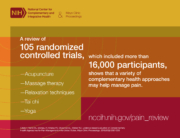Therapeutic Yoga
The practice of yoga has spread enormously in the west in the last decades. It is a concept most people have heard of and, in increasing numbers, are willing to explore. In India, where yoga originates, there has already been extensive research on its benefits for all aspects of the human being: body, mind, and spirit. Research on the health benefits of yoga practice is slowly growing in the west and studies so far indicate that yoga has positive effects on various health issues. For example, Harvard study finds yoga and meditation reduces healthcare costs by 43% and the NIH NCCIH has already successfully conducted scientific research revealing the positive benefits of yoga on health, balance and low back pain.
http://nccih.nih.gov/video/yoga

The NIM Center will aim to produce its own clinical research on yoga and its effects on relevant health issues, such as musculoskeletal pain, obesity, diabetes, metabolic and coronary disease, and psychological problems. Starting with smaller qualitative pilot studies, eventually the aim will be to carry out larger, randomized controlled trials, which are needed in the field.
Yoga therapy focus groups will be provided for patients with similar chronic illnesses. These structured courses will work in collaboration with the region’s general practitioners and hospitals, who will be both notified of patient participation and informed about their progress. Focus groups could for example be divided into lifestyle related (diabetes, coronary disease, hypercholesterolemia and hypertension, obesity), chronic pain, KRAM, psychiatric ailments, and cancer-related issues.

There will be a range of yoga classes provided; from restorative yoga for rehabilitation, pain, injuries and illnesses to dynamic yoga for exercise, strength and injury prevention. There are physical, psychological and spiritual benefits of yoga postures, breathing exercises and meditation. Yin Yoga, for example, is a restorative yoga posture system that focuses on non-straining, slow and intense stretches that work deeply on the connective tissues and release tension without forcing. It is ideal as a gentle form of yoga for patients with injuries.
All NIM Yoga Therapists will be certified by the internationally recognized, Yoga Alliance. http://www.yogaalliance.org/ and specifically trained in yoga for cardiac and cancer patients based on the work of Nischala Devi, originally trained in Western medicine, founding developer of the yoga portion of The Dean Ornish Program for Reversing Heart Disease, and co-founder of the award-winning Commonweal Cancer Help Program.
Nutritional Awareness
A healthy digestion is an important factor for a strong, resilient immune system. Lifestyle factors such as stress, nutrient deficiencies, food intolerences, stimulants, parasites and a lack of digestive enzymes weaken the immune system. Strengthening a person’s immune defenses through nutritional awareness is preventative medicine that strengthens the overall health of the individual.
The NIM Nutritional Therapist empowers people through individual guidance and group workshops that provide knowledge on how to obtain optimal health through nutritional awareness of their personal diet. All NIM Nutritional Health Coaches apply the principals of functional medicine and evidence-based nutritional research:
- Focus on determining the optimal diet for each individual, acknowledging that different bodies need different foods. The nutritionist and physician will assist the patients in the process of discovering their individual dietary needs by gradual changes and experiments with their diets.
- Biochemical tests as one of the tools in guiding the individuals in terms of allergies, intolerances, nutritional needs and deficiencies.
- Guiding and inspiring the patients and other participants in the IM Kitchen in choosing and preparing for example low and slow carbohydrate, vegetarian, vegan, gluten-free or dairy-free foods and meals, focusing on healthy fats, wholesome carbohydrates and a variety of protein sources.
- Collaboration with nutrition researchers at Rigshospitalet and other university hospitals.
- Collaboration with Center for Ernæring og Terapi (CET) and other evidence- and research-oriented nutritionists, centers and institutions.
- Information for the public and patients on ecology, sustainability and biodynamic foods, how to assess the products and interpret ingredients lists when shopping food, information on additives, unhealthy forms of macronutrients and so on.











Leave A Comment